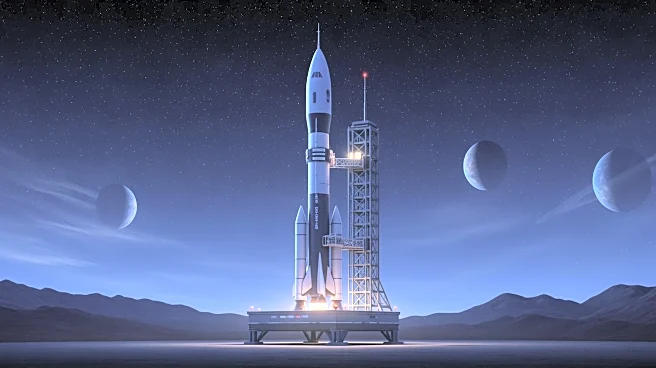What's Happening?
Blue Origin's New Glenn rocket is set to launch a NASA mission to Mars on November 9, 2025. The mission, known as ESCAPADE (Escape and Plasma Acceleration and Dynamics Explorers), aims to study Mars' atmosphere
and space weather. The mission involves two spacecraft, Blue and Gold, which will first travel to the Earth-Sun Lagrange Point 2 (L2) to study space weather for 12 months before heading to Mars. Once at Mars, the probes will map the planet's magnetic fields, ionosphere, and upper atmosphere in 3D, providing a stereo view of Mars' near-space environment. This mission marks a significant step in Mars exploration, following a five-year gap since the last Mars mission.
Why It's Important?
The ESCAPADE mission is crucial for understanding how Mars lost its atmosphere over billions of years, which is vital for future exploration and potential settlement on the planet. The data collected will help scientists understand the conditions on Mars that could affect human missions. Blue Origin's New Glenn rocket, with its reusable first stage, represents a significant advancement in space travel technology, potentially paving the way for more efficient and cost-effective missions to Mars and beyond. The mission's success could influence future space exploration strategies and technologies, particularly in the context of human exploration of Mars.
What's Next?
The ESCAPADE mission will require precise timing, taking advantage of a favorable orbital alignment between Earth and Mars. Once the probes reach Mars, they will spend seven months lowering themselves into orbits to gather critical data on the Martian atmosphere. The mission is expected to last at least 11 months, providing researchers with valuable data to study. The success of this mission could lead to further advancements in reusable rocket technology and influence future Mars exploration missions, including those focused on human settlement.
Beyond the Headlines
The ESCAPADE mission could have long-term implications for understanding Mars' habitability, both in the past and potentially in the future. By studying the Martian atmosphere's composition and evolution, scientists can gain insights into the planet's climate history and its ability to retain water. These findings could inform future missions aimed at human exploration and settlement, ensuring the safety and sustainability of astronauts on Mars.









